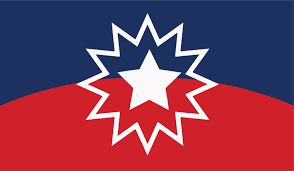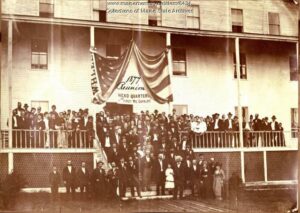Juneteenth
Juneteenth is now a federal holiday celebrating the emancipation of enslaved African Americans. It has been celebrated since June 19, 1865 when enslaved people in Galveston, TX were finally liberated by Union soldiers, over two years after the Emancipation Proclamation.

The Juneteenth flag was created in 1997 by activist and organizer Ben Haith. He is also the founder of the National Juneteenth Celebration Foundation. Details about the flag’s design can be found in an article by Alliyah Logan in Parade Magazine:
“The Juneteenth flag symbolizes freedom and justice for Black Americans and African Americans. The colors of the flag are similar to the United States flag because all Americans are able to understand and recognize the importance of African American history. One can not separate African American history from America’s history and the flag reminds us of just that.
The colors of the flag were deliberately chosen by Haith and the collaborators to showcase that African Americans were always American even throughout enslavement. The Black community is one with America. The colors chosen furthers the notion that America must ensure that all citizens have access to ‘liberty and justice for all’.
The most noticeable feature of the flag is its star and arc. The star is another callback to the United States flag – representing that Black people are free in all 50th states. The Emancipation Proclamation was first to read and acknowledged in Galveston, Texas. Texas, also known as the Lone Star State played a significant role in the addition of the star. Although Texas was the state that the documentation was read in, it represents freedom across the nation. Alongside the star, the outlined burst and arc represent the new horizon and new opportunities that are to come for Black people.”
Juneteenth Resources:
- 2024 Juneteenth events at PPL
- 2024 Juneteenth events elsewhere in the state
- National Museum of African American History and Culture
- The Emancipation Proclamation
- The Birth of Juneteenth; Voices of the Enslaved
- Juneteenth Booklist
- Maine’s Visible Black History
Previous PPL Blog Posts:

Frederick Douglass, Old Orchard Beach, 1877
Contributed by Maine State Archives to Maine Memory Network
Even More Juneteenth Resources
- Find the full NMAAHC Juneteenth discussion from Angela Tate, Mary Elliott, and Kelly E. Navies
- The National Museum of African American History & Culture has a Juneteenth portal and a digital toolkit where you can read historical documents, watch historical films, find recommended reads, and look through items of historical significance in the collections of the museum.
- Check out Portland Public Library’s Juneteenth booklist. This list shares nonfiction and fiction titles related to history, resistance, emancipation, liberation, joy and well-being, and culture. You can find Vanessa M. Holden writing on African American women and resistance, Jesse McCarthy on reparations, and Nicole A. Taylor on years of Juneteenth celebrations.
- The Juneteenth list also includes titles like This is the Honey: An Anthology of Contemporary Black Poets, The Black Joy Project, Rest is Resistance, How the Word is Passed, My People: Five Decades of Writing About Black Lives, Jubilee: Recipes from Two Centuries of African American Cooking, Make Good the Promises, and much more. For more resources from PPL you can reach us at the library, readersadvisory@portlib.org, or 207-871-1700 ext. 725.
Historic Places in Maine
Local Organizations and their missions:
- Black Owned Maine – Our mission is to promote economic empowerment for Black people in Maine
- Portland Racial Justice Congress – Mobilizing for a more socially conscious, culturally vibrant, and racially just Portland
- Tender Table – Celebrating Black and Brown community by connecting and honoring our identities, traditions, joy, resilience, and fight for collective liberation through storytelling and food
- Black Portland Organizers Working to End Racism (P.O.W.E.R) – Through our work, we seek to end the systematic oppression of Black people
- Southern Maine Workers’ Center – “We’re a grassroots, member led organization working to improve the lives, working conditions, and terms of employment for working class and poor people in Maine”
- The Alpha Legal Foundation – Increasing the number of underrepresented attorneys in Maine’s top positions of legal leadership and scholarship
- I Am Willing – provides tools and resources specifically designed to help the Black community create legacy plans
- Portland Empowered – strives to ensure that student and parent voices are reflected in policy and practice within Portland Public Schools
- The Third Place – Creating An Equitable Quality of Place for Black Mainers
- Maine Youth Action Network (MYAN) – a statewide network of committed adults and passionate young people who believe in the transformative power of youth leadership
- Survivor Speak – formed to push the movement to address root causes of what we call ‘sexploitation’: systemic poverty, racism, and misogyny
Other Organizations and their missions:
- Black Spirit 4 Life – Celebrating cultural diversity through unity
- The Greater Bangor Area Branch NAACP – an all-volunteer, nonprofit, nonpartisan organization dedicated to the eradication of racism in all its forms
- Bowdoin Black Student Union – The goal of the Black Student Union is to support all of its members academically and socially in order to help them reach the highest levels of achievement on campus.
- Maine Inside Out – activates individuals and communities to imagine and embody freedom through art, advocacy and support, and transformative justice
- The Maine Women’s Fund – “We are consciously, thoughtfully, and actively learning to use our organizational power and privilege to redistribute and rebalance power and resources”
- Downeast Diversity – Stories of people and culture in Maine
- The Mount Desert Island Racial Equity Working group – “We are a group of Mount Desert Island residents who aim to deepen our understanding of power and privilege and to foster racial justice, equity, and inclusion on MDI and beyond, always recognizing our shared humanity”
- Black Heritage Trail NH – Promotes awareness and appreciation of African American history and life in order to build more inclusive communities today
- Seacoast African American Cultural Center – Sharing our history within the community
